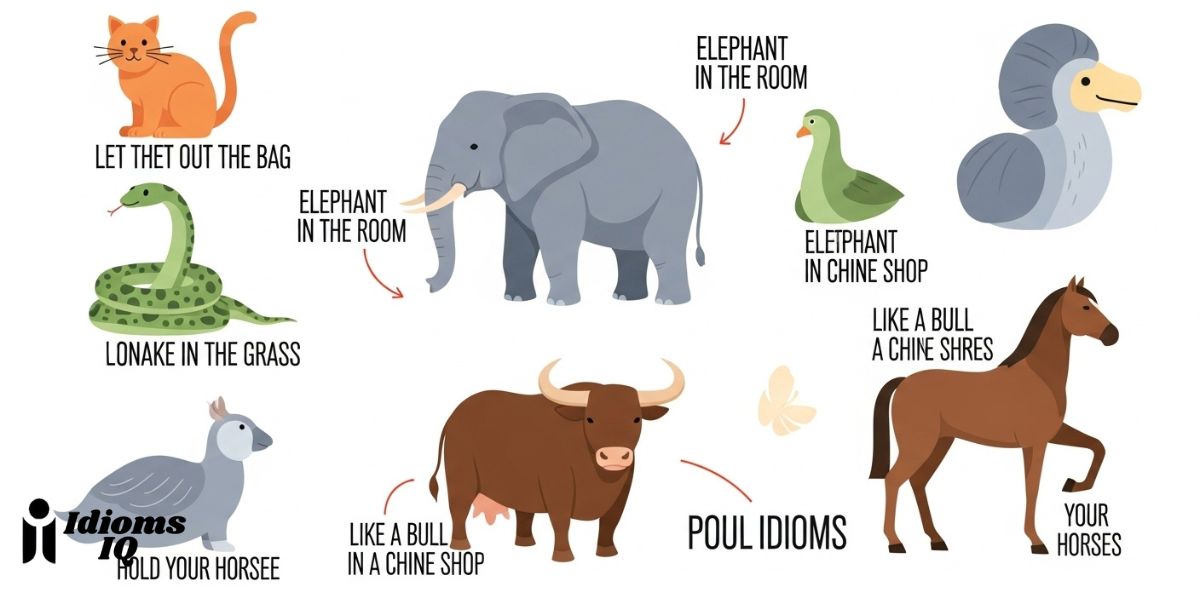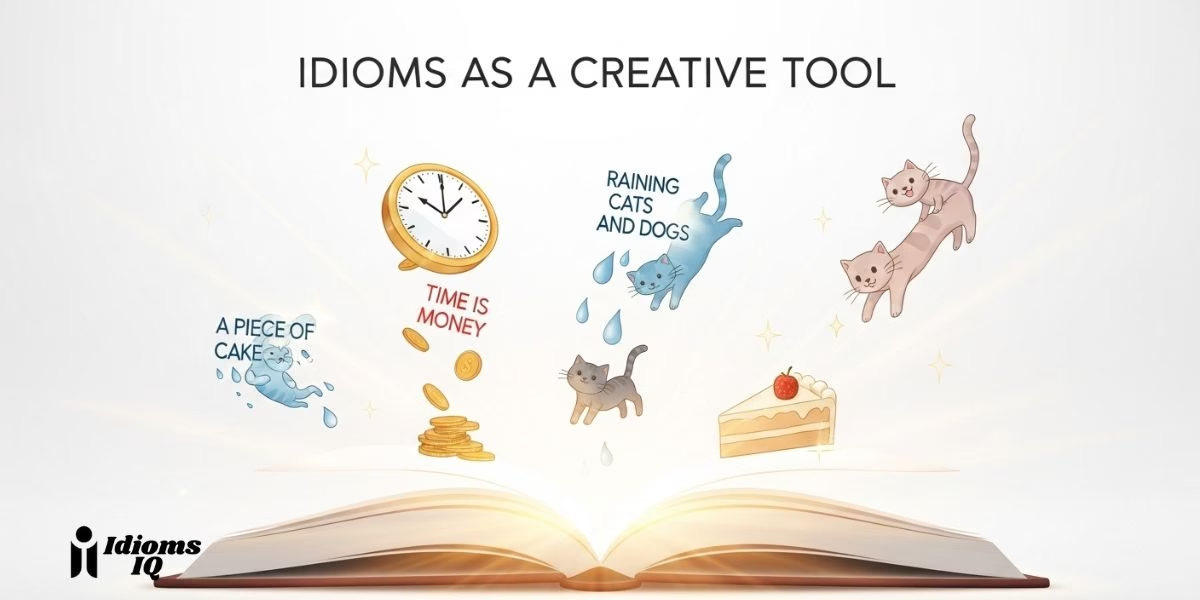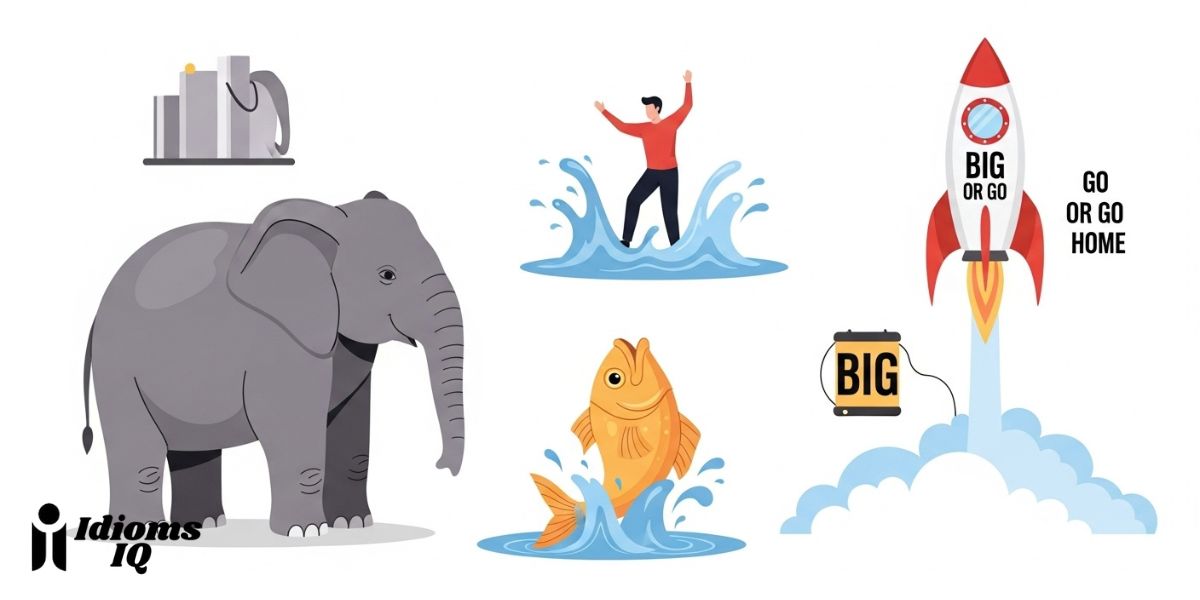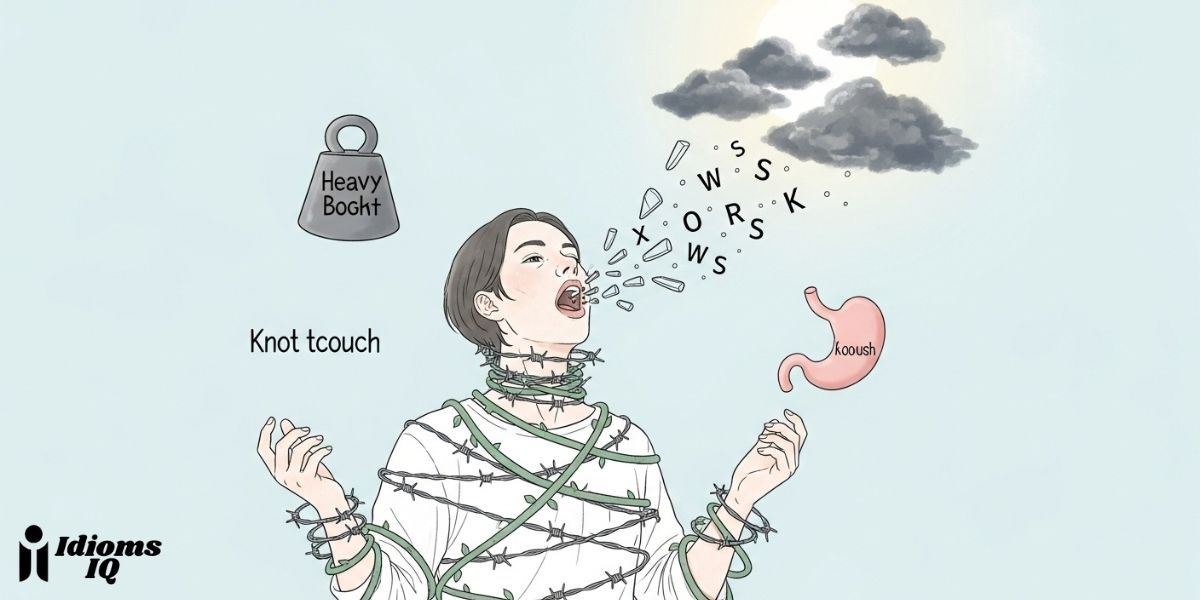
Death is a profound, universal experience, yet it is often the most difficult subject to talk about. The finality of it can make direct words feel blunt, cold, and inadequate. To navigate this delicate topic, we turn to the gentle, creative power of idioms. An idiom is a common phrase with a figurative meaning that differs from its literal one.
They are a kind of cultural shorthand that allows us to express complex ideas with nuance and emotion. In the case of death, idioms are often euphemisms softer expressions used to speak about a difficult subject with grace and sensitivity. This article explores 40 common idioms for death, helping to illuminate the creative and compassionate ways our language approaches this inevitable part of life.
Related: Idioms About Light
Why We Use Idioms for Death
Direct language about death can be jarring and painful for those who are grieving. Idioms act as a form of social and emotional cushioning, allowing us to convey the news of a loss with respect and gentleness. In art and literature, these expressions are crucial for setting the tone. Is a character’s passing a peaceful “drifting off,” a tragic “untimely end,” or even a comical “kicking the bucket”? Idioms allow writers to express loss in a way that feels authentic and culturally resonant, softening the harsh reality of the subject while still communicating the essential truth.
Idioms for Death
Here is a collection of common idioms and euphemisms used to talk about death, ranging from the gentle and poetic to the informal and direct.
Gentle & Peaceful
1. Passed Away
- Meaning: A soft and gentle way to say that someone has died.
- Usage Example: “I was so sorry to hear that your grandmother passed away last week.”
- This is the most common, polite, and respectful euphemism for death in modern English.
2. At Peace / At Rest
- Meaning: The person is no longer suffering from the pain or struggles of life.
- Usage Example: “After his long battle with illness, he is finally at peace.”
- These phrases offer a sense of comfort by focusing on the cessation of suffering.
3. Gone to a Better Place
- Meaning: The person has passed on to heaven or a peaceful afterlife.
- Usage Example: “Don’t be sad; he’s gone to a better place now.”
- This is a comforting spiritual idiom used to reassure the grieving.
4. Fell Asleep
- Meaning: To die peacefully, often in one’s sleep.
- Usage Example: “He was 98 years old and simply fell asleep in his favourite armchair.”
- This gentle idiom compares death to the peaceful act of sleeping.
5. Entered into Rest
- Meaning: A formal and peaceful way to say someone has died.
- Usage Example: “The family announced that their beloved mother entered into rest on Tuesday morning.”
- This phrase has a slightly religious or spiritual connotation, emphasizing peace.
Journey & Transition

6. Crossed Over
- Meaning: To pass from the world of the living to the spirit world or the afterlife.
- Usage Example: “Many people who have near-death experiences say they felt themselves starting to cross over.”
- This idiom frames death as a journey to another realm or state of being.
7. Gone Home
- Meaning: To return to a spiritual home or heaven after life on Earth.
- Usage Example: “The pastor comforted the congregation, saying that their friend had not died, but had gone home.”
- This is a deeply comforting religious idiom, suggesting a return to a place of belonging.
8. Gone to Meet Their Maker
- Meaning: To die and face God or the creator.
- Usage Example: “After a long and full life, he was ready to go to meet his maker.”
- This is a common idiom within Abrahamic religious traditions.
9. His Watch Has Ended
- Meaning: A person’s time of duty or life’s struggle is over, and they can now rest.
- Usage Example: “For the brave firefighter who saved so many, his watch has ended.”
- This formal, honorable phrase was popularized by the series Game of Thrones but has older military roots.
10. Crossed the Rainbow Bridge
- Meaning: A beloved pet has died and gone to a heavenly place for animals.
- Usage Example: “We were so sad when our dog Sparky crossed the rainbow bridge last year.”
- This is a very common and comforting idiom used specifically for the death of a pet.
Informal & Direct

11. Kicked the Bucket
- Meaning: A very informal, humorous, or blunt way to say someone has died.
- Usage Example: “My old car finally kicked the bucket after 300,000 miles.”
- This is one of the most famous idioms for death, but it’s considered too informal for use in sad situations.
12. Bit the Dust
- Meaning: To die, fall in battle, or fail completely.
- Usage Example: “In the old western movie, many cowboys bit the dust during the shootout.”
- This idiom evokes an image of someone falling to the ground in a fight.
13. Bought the Farm
- Meaning: To die, often suddenly or in an accident, particularly in a military context.
- Usage Example: “He was a pilot in the war, but thankfully he never bought the farm.”
- This idiom is thought to originate from military slang, possibly from pilots crashing into farmland.
14. Pushing Up Daisies
- Meaning: To be dead and buried in the ground.
- Usage Example: “If you keep driving like that, you’ll be pushing up daisies before you know it.”
- This is a dark-humor idiom that refers to the flowers that might grow over a grave.
15. Six Feet Under
- Meaning: Dead and buried.
- Usage Example: “He joked that he’d be six feet under before he ever paid off his student loans.”
- This idiom refers to the standard depth for a grave in many Western cultures.
16. Cashed in Their Chips
- Meaning: To die, comparing life to a poker game where one is done playing.
- Usage Example: “After a long and exciting life, he finally cashed in his chips at the age of 92.”
- This informal idiom frames life as a game that has come to its natural conclusion.
17. To Take a Dirt Nap
- Meaning: A slang and humorous term for being dead and buried.
- Usage Example: “The villain in the story threatened that the hero was about to take a dirt nap.”
- This is a very informal, almost flippant, way to refer to being buried.
Figurative & Poetic

18. Shuffled Off This Mortal Coil
- Meaning: To die and leave behind the troubles of the mortal world.
- Usage Example: “In his famous soliloquy, Hamlet contemplates what happens after we have shuffled off this mortal coil.”
- This beautiful and poetic phrase was coined by William Shakespeare in Hamlet.
19. Joined the Choir Invisible
- Meaning: To pass away and join the collective, spiritual existence of all who have died before.
- Usage Example: “With the passing of the great singer, another beautiful voice has joined the choir invisible.”
- This elegant and comforting phrase comes from a poem by George Eliot.
20. Gave Up the Ghost
- Meaning: To die; to release one’s spirit from the body.
- Usage Example: “After a long and difficult struggle, the old man finally gave up the ghost.”
- This is an ancient idiom that comes from biblical translations, referring to the spirit leaving the body.
21. Their Number Was Up
- Meaning: It was their time to die; their death was fated.
- Usage Example: “The soldier escaped many close calls, but in the final battle, his number was up.”
- This idiom suggests that death is a matter of destiny or chance, like a lottery number being called.
22. Curtains for Someone
- Meaning: It is the end; the person is finished or is going to die.
- Usage Example: “When the engine failed at 10,000 feet, the pilot thought it was curtains for him.”
- This theatrical idiom compares death to the final curtain falling at the end of a play.
Formal & General

23. No Longer With Us
- Meaning: A gentle and indirect way to say that someone has died.
- Usage Example: “I’m calling on behalf of my father, who is sadly no longer with us.”
- This is a common, polite phrase used in formal announcements and obituaries.
24. Lost Their Life
- Meaning: To die, especially in an accident, disaster, or conflict.
- Usage Example: “Three firefighters tragically lost their lives while battling the blaze.”
- This phrase is often used in news reporting to describe deaths that occurred during a specific event.
25. At Death’s Door
- Meaning: To be very close to dying.
- Usage Example: “The doctors said he was at death’s door, but he made a miraculous recovery.”
- This idiom is used to describe someone who is critically ill or injured but still alive.
26. On Their Last Legs
- Meaning: To be in a very weak state, close to failure or death.
- Usage Example: “The old family business is on its last legs and may not survive another year.”
- This can be used for people, but it is also very common to describe failing objects or organizations.
27. The Dearly Departed
- Meaning: A respectful and formal term for a person or people who have recently died.
- Usage Example: “We are gathered here today to remember the dearly departed.”
- This phrase is standard in funerals, eulogies, and formal contexts of mourning.
28. To Expire
- Meaning: A formal, clinical, or legal term for to die.
- Usage Example: “The patient expired at 3:15 AM, according to the official hospital report.”
- This term is often used in official documents like death certificates.
29. To Perish
- Meaning: To die, especially in a violent, sudden, or disastrous way.
- Usage Example: “It is feared that many people perished in the earthquake.”
- This word carries a strong connotation of a tragic and often large-scale loss of life.
30. Food for Worms
- Meaning: A grim and darkly humorous way to say someone is dead and buried.
- Usage Example: “Shakespeare’s Mercutio, after being stabbed, says he will be ‘a grave man’ and ‘food for worms’.”
- This idiom directly confronts the physical reality of decomposition in a blunt way.
31. To Be Gathered to One’s People
- Meaning: A formal and ancient way to say someone has died and joined their ancestors in the afterlife.
- Usage Example: “After a long and fulfilling life, the village elder was finally gathered to his people.”
- This is a very old phrase, often found in biblical texts, that emphasizes a sense of belonging and community even in death.
32. To Meet a Sticky End
- Meaning: To die in a particularly unpleasant, messy, or ignominious way.
- Usage Example: “The villain in the fantasy novel met a sticky end after falling into a dragon’s lair.”
- This informal idiom is often used to describe a deserved or gruesomely fitting death in a story.
33. To Check Out
- Meaning: An informal, casual, or slang term for dying.
- Usage Example: “He lived a fast life and checked out at the age of 27.”
- This idiom compares life to a stay in a hotel, with death being the final act of “checking out.”
34. To Croak
- Meaning: A very informal and somewhat vulgar or humorous slang term for to die.
- Usage Example: “The old pirate in the story cackled that he would outlive all his enemies before he finally croaked.”
- This term can be considered disrespectful in a serious context and is often used in fiction for dramatic or comedic effect.
35. To Flatline
- Meaning: To die, specifically referring to the moment the heart stops, as shown by a flat line on a heart monitor.
- Usage Example: “The medical team did everything they could, but the patient flatlined on the operating table.”
- This is a modern, clinical idiom that has moved from medical jargon into common use.
36. To Be Sleeping with the Fishes
- Meaning: To be murdered and have your body disposed of in a body of water.
- Usage Example: “If you betray the mob boss, you’ll find yourself sleeping with the fishes.”
- This slang term was famously popularized by the movie The Godfather and is exclusively used in a crime or gangster context.
37. To Go Belly Up
- Meaning: To die or, more commonly, to fail completely.
- Usage Example: “After the economic crash, his new business went belly up within six months.”
- This idiom, which comes from the image of a dead fish floating on the surface, is used more often for business failure than for a person’s death.
38. To Snuff It
- Meaning: A common British slang term for to die.
- Usage Example: “Did you hear about old Jim from down the street? He finally snuffed it last night.”
- This idiom compares the extinguishing of life to the act of snuffing out a candle flame.
39. To Pay the Ultimate Price
- Meaning: To die in service of a great cause, belief, or country; to sacrifice one’s life.
- Usage Example: “The soldier paid the ultimate price to defend his nation’s freedom.”
- This is a formal and honorable idiom used almost exclusively in heroic, military, or sacrificial contexts.
40. To Be Out of One’s Misery
- Meaning: To die after a period of prolonged pain, suffering, or illness.
- Usage Example: “After her long and difficult battle with cancer, her family was sad but also relieved that she was finally out of her misery.”
- This is a compassionate idiom that frames death as a welcome release from suffering.
Practice Your New Vocabulary: Fill in the Blanks
Ready to test your knowledge? Fill in the blanks with the best idiom from the list.
- After a long and brave fight with cancer, she is finally ________________.
- My great-grandfather was over 100 years old when he finally ________________.
- The gangster in the movie warned the hero that he would be ________________ if he talked to the police.
- It’s a very old car, and I think it’s on its ________________.
- He was a war hero who was prepared to ________________ for his country.
- It was a very informal will, written on a napkin, that said, “When I ________________, my dog gets everything.”
- The family found comfort in believing their mother had simply ________________ and was with her parents again.
- It’s a dangerous stunt, and many people have ________________ trying to perform it.
- He was so ill that his passing was a relief; he was finally ________________.
- The funeral was a time to remember our ________________.
Answers
- at peace
- passed away
- sleeping with the fishes
- last legs
- pay the ultimate price
- kick the bucket
- gone home
- lost their lives
- out of his misery
- dearly departed
Conclusion
The way we talk about death reveals our deepest hopes, fears, and beliefs. The vast collection of idioms for this subject shows our collective need to approach loss with comfort, respect, and meaning. These phrases are a testament to the creativity and empathy embedded in our language, allowing us to soften a harsh reality and frame a final goodbye in more gentle terms.
We encourage you to notice these idioms in conversation and literature, appreciating them not just as words, but as expressions of our shared human experience. If this collection was meaningful to you, continue exploring our other posts on figurative language to find the words for all of life’s complex emotions.






